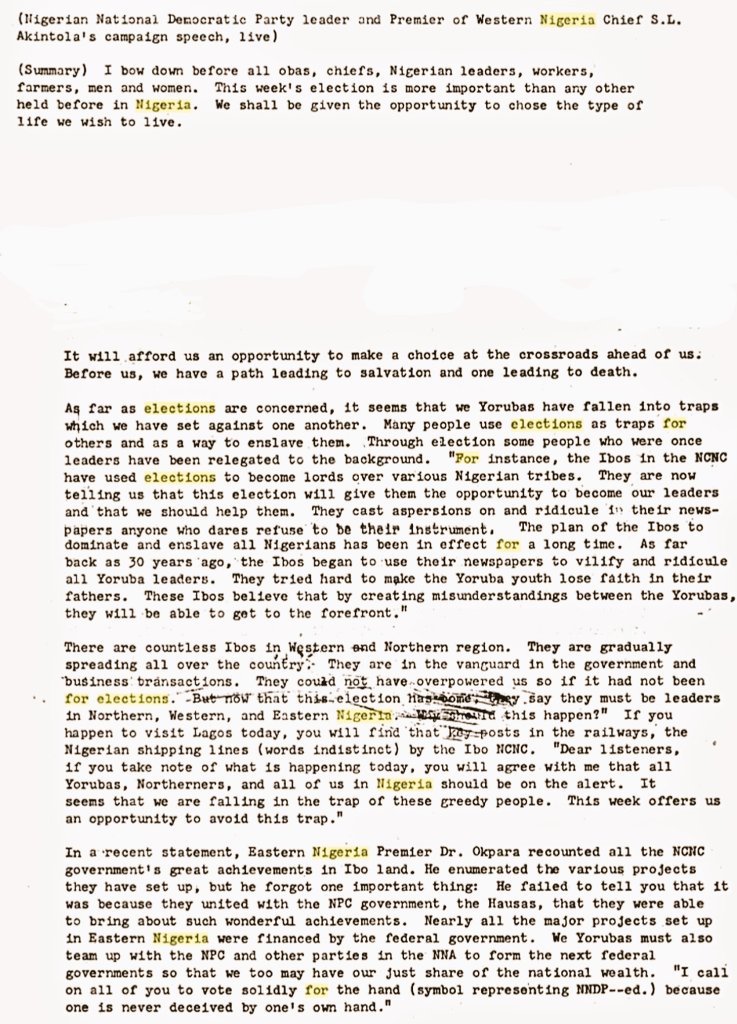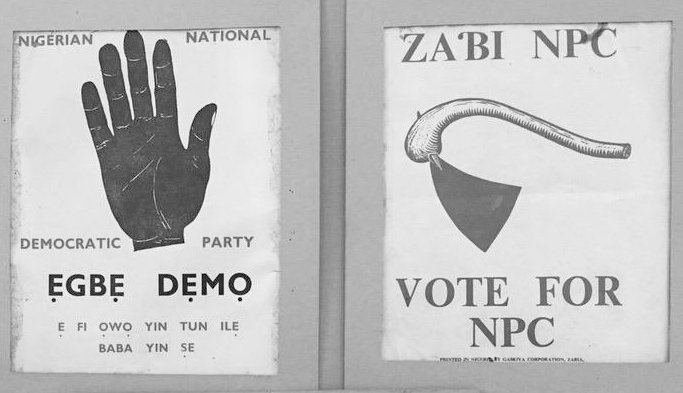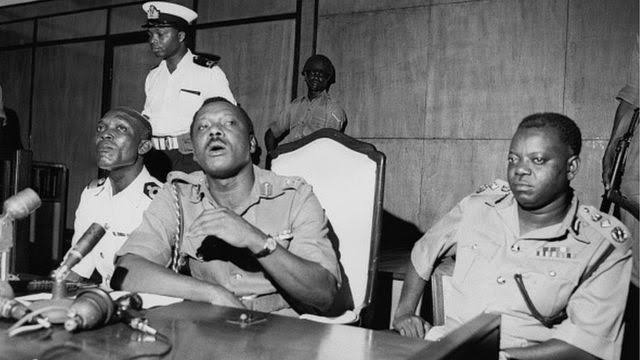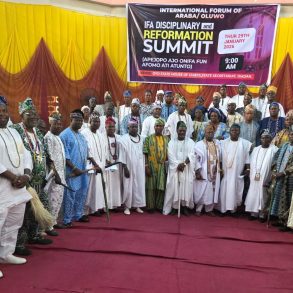By Adejumo David Adebayo
For instance while the going was good and the marriage of convenience with the Northerners was a rig , Nnamdi Azikiwe said nothing whatsoever publicly about the Tiv riots in order not to annoy the political leaders of the North.
The Coalition Government of 1959 gave a grand opportunity to the Igbo to use Federal Government resources to entrench themselves in key positions and to intensify their education training.
Nigerian Railway Corporation, Dr Ikejiani was Chairman, of 431 members of staff, 270 were Igbo.In the Nigerian Ports Authority, because an Igbo was minister of transport, 21 of the topmost offices were occupied by Igbo, out of a total of 104 other top positions, 73 were occupied by Igbo, 23 by Yorùbá and only 8 by other ethnic groups.Turning to the yaba technical institute, 21 of the 29 Indigenous senior staff were Igbo. There were 9 Igbo ambassadors while the figures for the western, northern and Midwestern regions were 3,4 and 2 respectively.
Even Scholarships, Recruitment and promotions were no longer based on Merit.
These are one of the reasons Samuel Akintola sought to end Yorùbá Opposition and align with NPC. This was what led Samuel Akintola to lead ” Upganism” in which it sought to demonstrate that the Igbo monopolized everything in Nigeria.
The Final Campaign Broadcast Message of the Nigerian National Democratic Party (NNDP), which started by 6:30pm today – December 28, 1964, on behalf of the Nigerian National Alliance (NNA) has just ended The live broadcast was on the Yorùbá Service of the Lagos Nigeria Domestic Radio. Chief Samuel Ladoke Akintola, the leader of the Nigerian National Democratic Party (NNDP) and Premier of Western Region, was the one who read the address, in Yorùbá.
“It will afford us a lot of opportunity to make a choice at the crossroads ahead of us. Before us, we have a path leading to salvation and one leading to death.”
“It seems the Yorubas have used this election to set traps against one another; traps of which they have also fallen into themselves. He further said that a lot of people use the election as a trap to enslave other people and that some people who were leaders before the election, end up being relegated to the background after the election.
“For instance, the Ibos in the NCNC, have used the elections to become lords over various Nigerian tribes. They are now telling us that this election will give them an opportunity to become our leaders and that we should help them. They cast aspersions and ridicule on their newspaper anyone who dares refuses to be their instrument. The plan for the Igbos to dominate and enslave all Nigerians has been in effect for a long time.”
Chief Akintola now emphasized further that for the past 30 years, the Ibos have been using their newspapers to vilify Yorùbá leaders, and have been working very hard to make the Yorùbá youths lose faith in their fathers.
Ibos believe that by “creating misunderstandings between the Yorubas, they will be able to get to the forefront.”
Speaking on, he highlighted that the Ibos are currently all across all regions of Nigeria, and that they keep spreading. He pointed out that they’re currently holding key positions in government and in business, and will take over key positions all over the country and especially in Lagos (like the railways), if they are given more power by being elected into govt in the coming election.


Prior to the above, December 28, 1964 Akintola Speech , It was an opportunity which the “Ibo National Caucus”, formed not long after the end of the Second World War—precisely in 1948—would not wish to miss. Its aim was summarized in a moment of indiscretion by C. D. Onyeama in the famous utterance at the Island Club, Lagos, “that the domination of Nigeria by the Ibo is only a question of time”
1949 Ibo State Union Manifesto of Dr Nnamdi Azikwe: “It would appear that the God of Africa has specifically created the Ibo nation to lead the children of African from the bondage of the ages…. The martial prowess of the Ibo nation at all stages of human history has enabled them not only to conquer others but also to adapt themselves to the role of preserver. The Ibo nation cannot shrirk its responsibilities.
From the above, It’s not Farfetched why Akintola would have been target for elimination in the Jan Coup that would happen later in 1966 while Awolowo was in Prison.
Many observers who watched with interest the establishment of the University of Nigeria in 1960, at a time that the Igbo would not require the services of graduates of such a University, began to suspect that it was a masterly-designed strategy to provide “backward” areas in Northern Nigeria with Igbo personnel.
This measure led their Yorùbá rivals—who also needed no University— to found the University of Ifè.
However the discovery of oil in commercial quantities and the creation of the Mid-West State out of the former Western Region, began to make the Igbo leaders in the Eastern Region say things which their “Northern partners” felt extremely offensive and provocative.
The Premier of the Eastern Region, Dr Michael Okpara, began to threaten secession and began to argue that revenue be allocated according to the principle of derivation.
The Jan Coup Was Indeed Tool to Actualize Seizure of the Country by Igbo Caucus
Needless to say, the Igbo National Caucus decided to exploit the situation in the West to the best advantage.
The Caucus recorded:
“𝐅𝐨𝐫 𝐭𝐡𝐞 𝐂𝐚𝐮𝐜𝐮𝐬 𝐭𝐡𝐞 𝐍𝐨𝐫𝐭𝐡 𝐰𝐚𝐬 𝐧𝐨𝐭 𝐚 𝐝𝐚𝐧𝐠𝐞𝐫: 𝐭𝐡𝐞 𝐖𝐞𝐬𝐭 𝐰𝐚𝐬 𝐭𝐡𝐞 𝐝𝐚𝐧𝐠𝐞𝐫.”
𝐖𝐨𝐫𝐫𝐢𝐞𝐝 𝐭𝐡𝐚𝐭 𝐭𝐡𝐞 𝐩𝐫𝐞𝐦𝐚𝐭𝐮𝐫𝐞 𝐣𝐮𝐛𝐢𝐥𝐚𝐭𝐢𝐨𝐧 𝐚𝐧𝐝 𝐢𝐧𝐝𝐢𝐬𝐜𝐫𝐞𝐞𝐭 𝐬𝐭𝐚𝐭𝐞𝐦𝐞𝐧𝐭𝐬 𝐨𝐟 𝐬𝐨𝐦𝐞 𝐈𝐠𝐛𝐨 𝐢𝐧𝐝𝐢𝐯𝐢𝐝𝐮𝐚𝐥𝐬 𝐭𝐡𝐚𝐭 𝐭𝐞𝐧𝐝𝐞𝐝 𝐭𝐨 𝐰𝐚𝐫𝐧 𝐭𝐡𝐞 𝐘𝐨𝐫𝐮𝐛𝐚 𝐚𝐧𝐝 𝐭𝐡𝐞 𝐇𝐚𝐮𝐬𝐚-𝐅𝐮𝐥𝐚𝐧𝐢 “𝐨𝐟 𝐨𝐮𝐫 𝐨𝐛𝐣𝐞𝐜𝐭𝐢𝐯𝐞”— 𝐭𝐡𝐚𝐭 𝐢𝐬 𝐬𝐞𝐢𝐳𝐮𝐫𝐞 𝐨𝐟 𝐭𝐡𝐞 𝐜𝐨𝐧𝐭𝐫𝐨𝐥 𝐨𝐟 𝐭𝐡𝐞 𝐜𝐨𝐮𝐧𝐭𝐫𝐲—𝐦𝐢𝐠𝐡𝐭 𝐞𝐧𝐝𝐚𝐧𝐠𝐞𝐫 𝐭𝐡𝐞 𝐜𝐚𝐮𝐬𝐞, 𝐭𝐡𝐞 𝐂𝐚𝐮𝐜𝐮𝐬 𝐫𝐞𝐜𝐨𝐫𝐝𝐞𝐝:
“Enemies of our fatherland have alerted the decadent Yorùbás and the reactionary Northerners.
The indiscreet utterances of many of our own men have contributed largely to the dangers which now beset us when we have almost reached the promised land. These stupid utterances must stop”.
However, the Caucus believed that the cause was not yet lost:
The Caucus recorded:
“Despite the anti-Ibo propaganda now prevailing in the North and West a survey of the situation shows quite clearly that though the situation is critical, it is not hopeless.
In the East despite the amateurish leadership of Okpara the Onitsha Ibo and Ibo dispute has quietened. The Efiks, the Ibibios and the Rivers tribes are still under complete control even though their dreams of their own State have been completely shattered. Despite the intrigues of Okoti-Eboh and Omo Osagie we have succeeded in clamping Osadebay firmly on the Mid-West saddle thus taking care of the Urhobos, the Edos, and the Itshekiris. There is then nothing to fear in the Mid-West but threats. The West is now the Problem.”
The Caucus further stressed:
“If we can win the west at the next regional election by keeping the Yorùbá divided, we shall secure control of the federal cabinet and the country.
“Play up Awolowo at all times; this will keep up the resistance of the Action Group members and stop them from uniting with the N.N.D.P. to form a solid Yorùbá front. This is vital and there is no longer a headache or danger to us. Intensify all propaganda against Akintola.
Don’t hold that he is sufficiently discredited already, he is still dangerous.
We must always keep the quarrel between himself and the Action Group alive, this will ensure the disunity amongst the Yorùbá leaders. Seek all means to discredit Fani-Kayode.
He is the real and only barrier to our domination of the West and our ultimate control of the Federation.”
𝐉𝐀𝐍 𝟏𝟗𝟔𝟔 𝐂𝐎𝐔𝐏 𝐃’𝐄𝐓𝐀𝐓
The coup was executed by and large by the Igbo witness killing of all Northern Nigerian officers within reach and of Yorùbá officers suspected of being in sympathy with the Hausa-Fulani elite of Nigeria or wanting Political alliance i.e The NNDP/Akintola School of thought.
“Moreover no Igbo elite politician and disseminator of tribalism or sectionalism lost his life—the troops in Benin and Enugu, under Igbo control, refused to murder Dennis Osadebay and Michael Okpara respectively.”
The suspicion of Igbo domination grew as Igbos within the army were promoted to the rank of officers and the unification decree was issued in response to the minority report of only one member— Nwokedi, an Igbo—and against the firm recommendation of the majority of the Committee that had been set up to examine the proposal.
Frightened that the unification decree would establish firmly Igbo control all over the country the peoples of the North, in May 1966, rose up against Igbo inhabitants in the Northern Region.
This first of a series of spontaneous massacres of Igbos was the last straw which persuaded a number of Igbo leaders that their dream of Igbo domination was beyond achievement; that the size of Nigeria and the factor of loyalty to the tribe, rather than to “One Nigeria”, were strong among the large ethnic groups in the country; that justly or unjustly anti-Igbo feelings had risen very high in the rest of Nigeria.
But this is not to say that the generality of the Igbo saw themselves as seekers of dominance over the rest of Nigeria, or that the Igbo leadership saw itself as exploiters of other peoples in Nigeria.
The self-styled leaders and spokesmen of the Igbo people, mainly University “intellectuals”, argued passionately that it would be wrong to see the Igbo as grabbers of most of the offices in the country. Rightly considered, they contended, they deserved to hold these posts by virtue of their special talents.
They were superior to other ethnic groups in “culture and civilization”; they were the most receptive to new ideas and the most able to assimilate them.
It would be most unfair and unjust for any other people in Nigeria, particularly the Northerners, to wish to dominate Nigeria. For Northern Nigeria “lacked education and and culture, and was never in a position to contribute to the advancement or progress of the country”.
” In their opinion the sacrifices which the Igbo had made on behalf of Nigeria were enormous.
” The ethnocentric Yorùbá regarded the Igbo in Lagos as “strangers” in spite of the fact that investment opportunities were greater in Lagos, thanks to the siting in Yorùbáland of the federal capital, as well as the two federal universities.
The seizure of power by the collusion of the trio (Ironsi, Zik & Orizu) After The Jan Coup
… The Jan Coup was a faster way to achieve what Igbo National Caucus wanted as stated above, J.T.U Aguiyi Ironsi actualized it…
What Happened After The Jan 1966 Coup Was a transition to achieve a planned script.
…Dr Nwafor Orizu became The Acting President of The Country Nigeria.
When by the end of the day on Saturday 15th January there was no news as to the whereabouts of the prime minister, Orizu asked the ministers or what was left of the cabinet to choose an acting prime minister.
The meeting was held in the armed forces headquarters at Alagbon Close.
Alhaji Zanna Buka ‘ Dipcharima, the foreign minister, Alhaji Nuhu Bamali, the attorney-general, Dr T.O. Elias, Major-General Ironsi and some police officers of senior ranks were there.
Dr K.O. Mbadiwe was also there. It was not an enthusiastic ) gathering. The ministers of northern origin felt entrapped in Lagos.
The Igbo members looked grim and apprehensive at what had happened, while the Yorùbá were being self-righteous.
” Wait and you will see (they said they’d said)
These eye-to eye togetherly
Wait until they hurl curses
Like thunder bolts at one another
Stay away from cross fires “
“The right thing now is that we elect from among us, this council of ministers . . .” began the attorney-general. That gathering did not look or feel like a council of ministers at all.
They were all individuals working out in their minds how they were going to get out of Lagos and go somewhere they would feel safe.
“We have to elect an acting prime minister. Suggestions, please, gentlemen?” Someone mentioned Dipcharima.
Another person said Mbadiwe. Then nobody said anything more. It was then that Major-General Ironsi cleared his throat and said.
“Gentlemen, if I am to restore law and order you will have to hand the government over to me.” The attorney-general looked alarmed realising that this was what was called a fait accompli.
“It will be only for a short time,” Ironsi assured the gathering, “until we can sort out the constitutional system for the country.”
An expression of paradoxical relief found itself on the faces of the northerners. At least now they could go home.
At 11.50 p.m. that Sunday night the Acting President of the country, Dr Nwafor Orizu, told the whole country that he had been advised by the Council of Ministers, that they had unanimously agreed to hand over the government of the country to the armed forces because of the present circumstances.
Before he made his speech, the attorney-general had advised him to appoint an acting Prime Minister for the time being. He had said that it would never work.
“There has been a coup d’etat.
We cannot pretend that the army does not want to rule the country.”
As soon as the acting president had broadcast his message, there was a roll of drums and the supreme commander of the Nigeria Army, Major-General J.T.U. Aguiyi-Ironsi assumed the dual office of head of the federal military government and supreme commander of the armed forces.
He announced the suspension of the constitution, as well as the offices of President and Prime Minister.
The interesting thing about this event was that it was the coup within the coup.
Although Dr. Nwafor Orizu began his speech at 23:50 with, “I have tonight been advised by the Council of Ministers ..”
” There was evidence that the seizure of power by the collusion of the trio (Ironsi, Zik & Orizu) took place, at least, earlier in the day, this is because, Zik who was on convalescence in the UK issued a statement to the Press at his Burbridge Hotel on the situation in Nigeria in the morning of Sunday, 16 January 1966, and was reported in the Evening Edition of London Sunday Telegraph of that day.
This statement was issued in the morning of 16 Jan’66 in London while the ministers were still deliberating in Lagos. At this point, Ironsi was the GOC Nigerian Army & not GOC of the Armed Forces. Also, he was yet to assume the reins of the FG. Yet Zik called him both.
The Speech:
” Violence has never been an instrument used by us, as founding fathers of the Nigerian Republic, to solve political problems. In the British tradition, we talked the Colonial Office into accepting our challenges for a tête-À-tête, the demerits and merits of our case for self-government.
After six constitutional conferences in 1953, 1954, 1957, 1958, 1959, and 1960, Great Britain conceded to us the right to assert our political independence as from October 1, 1960. None of the Nigerian political parties ever adopted violent means to gain our political freedom and we are happy to claim that not a drop of British or Nigerian blood was shed in course of our national struggle for the place in the sun. This historical fact enabled me to state publicly in Nigeria that Her Majesty’s Government has presented self-government to us on a platter of gold. Of course, my contemporaries scorned at me, but the facts of history are irrefutable.
I consider it most unfortunate that our ‘Young Turks’ decided to introduce the element of violent revolution into Nigerian politics. No matter how they and our general public might have been provoked by obstinate and perhaps grasping politicians, it is an unwise policy. I have contacted General Aguiyi-Ironsi, General Officer Commanding the Nigerian Armed Forces, who I understand, has now assumed the reins of the Federal Government. I offered my services for any peace overtures to stop further bloodshed, to placate the mutinous officers, and to restore law and order. As soon as I hear from him, I shall make arrangements to return home.
As far as I am concerned, I regard the killings of our political and military leaders as a national calamity.”
Video attached:
The Revenge Coup: Northern Come back
It would appear that, at this stage, for days, the thinking among the Northern troops was that Nigeria had come to an end and that Northerners should recoil to the Northern Nigerian shell.
Although the emergence of Lt. Col. Yakubu Gowon was destined to change the course of history, entrench the army firmly on the saddle, and for the first time transform a branch of the educated elite—the soldiers— into nation builders, and entrenched northern power in the military and federation.
Culled: Just Before Dawn By Kole Omotoso
The Educated Elite of Nigerian society by Ayandele pHD
Nowa Omoigui, MD






